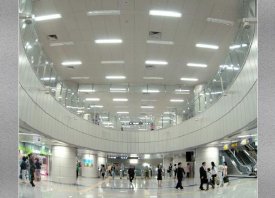BASF's specialty foam Basotect is used in the Metro Line 9 stations in Seoul, Korea, to provide a quieter and more comfortable experience for commuters. The sound-absorbing and flame-retardant Basotect was installed behind perforated steel walls in 25 subway stations of line 9. The foam was also chosen by the operators for its ease of maintenance.
 BASF's specialty foam Basotect as acoustic insulation in Seoul's subway
BASF's specialty foam Basotect as acoustic insulation in Seoul's subway
The lightweight and flexible Basotect stands out for its extraordinary acoustic properties. Thanks to its open-cell and fine foam structure, the sound-absorption values of the material in the medium and high frequency ranges are particularly good. Basotect reduces the vibration of the perforated steel walls. The system provides effective sound-absorption in the low frequency ranges as well.
"Regular exposure to noise in subways can have a detrimental effect on the hearing of commuters, since subways are typically long enclosed spaces where sounds from human traffic and trains are amplified. Reduction of the noise level is the best strategy to diminish the impact of this hazard. Such areas with high levels of noise can be easily restored to acoustic tolerability by using Basotect", says Dr. Christof Moeck, head of global business management Basotect.
The high level of thermal insulation brought about by the low thermal conductivity of Basotect contributes to energy-efficient construction. Basotect also meets stringent emission requirements due to its fiber-free properties. Moreover, the inherently flame-retardant Basotect is noted for its ease of processing and installing. As such, it is a cost-effective and easy material to maintain.
The first 25.5-kilometer section of the Seoul Metro Line 9, from Gimpo Airport to Sinnonhyeon in south-eastern Seoul, was opened to the public in July 2009. It will later be extended to the east of the capital. The remaining 12 subway stations of line 9 will be installed with Basotect in stages.